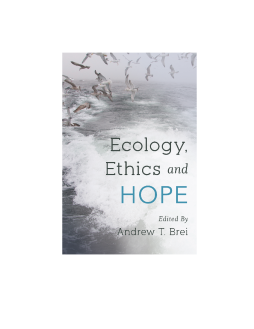
Additional Information
Book Details
Abstract
Ecology, Ethics, and Hope explores what hope is, how it operates, and whether or not it is important in our response to ecological challenges like climate change, deforestation, biodiversity loss, and pollution. The book offers an accessible and timely overview of this emerging topic within environmental ethics, a platform for further discussion, and refinement of the notion of hope.
Hope has started to receive more theoretical attention from philosophers and social scientists. In light of worsening ecological conditions, the concept of hope may offer motivation for us to change our destructive ways and conserve the ecosystem goods and systems we depend on. The authors in this collection take stock of the various accounts of what hope is (or is not), what it does (or does not), and how relevant it is to ecological thinking. The book covers topics including the psychology of hope (how it might operate and change minds), hope as a motivator of positive action, and hope’s essence in the context of a virtue- or obligation-focused morality.
Contributors:
Elizabeth Andre, Assistant Professor of Outdoor Education, Northland College, USA; Jonathan Beever, Postdoctoral Scholar, Rock Ethics Institute, Penn State University, USA; Andrew T. Brei, Visiting Assistant Professor of Philosophy, St Mary’s University; Andrew Fiala, Professor of Philosophy, California State University-Fresno, USA; Trevor Hedberg, Graduate Student, University of Tennessee Knoxville, USA; Lisa Kretz, Assistant Professor of Philosophy, University of Evansville, USA; Michael Nelson, Professor of Environmental Ethics and Philosophy, Oregon State University, USA; John Nolt, Professor of Philosophy, University of Tennessee Knoxville, USA; Brian Treanor, Professor of Philosophy, Loyola Marymount University, USA
Andrew T. Brei is Visiting Assistant Professor of Philosophy at St Mary’s University, TX, USA
The environmental future looks bleak. Scientific predictions are dire as degrading impacts of human activity continue unabated. We seem hell-bent on destroying nature, so what kind of hope could sane environmentalists harbor? How could we remain hopeful? Should we remain hopeful and for what? This erudite collection presents some of the very best work on hope in dark environmental times.
Allen Thompson, Associate Professor of Philosophy, Oregon State University
This excellent collection of essays conveys a powerful sense of the way hope is critically important, but desperately difficult to sustain, in connection with any clear-sighted response to the present threat of global ecological catastrophe. By jointly considering hope and environmental action, it both philosophically illuminates the former and offers significant support and advice for the latter.
Ariel Meirav, Senior Lecturer in Philosophy, University of Haifa
